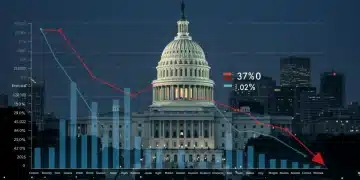Gas ssi monthly updates: what you need to know

Gas prices are influenced by factors such as global oil supply, geopolitical events, consumer demand, and local taxes, requiring effective monitoring and strategic management to minimize expenses.
Gas ssi monthly updates provide essential insights into the ever-changing landscape of gas prices. As market conditions shift, understanding these updates helps consumers make informed decisions and budget effectively. Have you considered how these fluctuations impact your daily life?
Understanding gas price trends
Understanding gas price trends is essential for consumers and businesses alike. With fluctuations often influenced by various factors, knowing the underlying reasons can help you make informed decisions.
Monthly gas prices can vary due to seasonal changes, geopolitical events, and shifts in supply and demand. Keeping an eye on these factors will enable you to anticipate price hikes.
Key Factors Influencing Gas Prices
Several components affect the price you pay at the pump. These include:
- Crude oil prices: Fluctuations in crude oil prices significantly impact gas costs.
- Seasonal changes: Demand often increases during summer driving season, pushing prices up.
- Local taxes: Different regions have varying tax rates, affecting overall costs.
Comprehending these trends allows you to plan your budget effectively. For instance, if you notice rising crude oil prices, it may be wise to fill up your tank soon before prices climb higher.
Strategies for Monitoring Gas Prices
Keeping track of gas prices can be made easier with some useful strategies:
- Use apps or websites that track gas prices in your area to find the best deals.
- Sign up for alerts that notify you of price drops or increases.
- Visit multiple gas stations when possible to compare prices.
By employing these strategies, you can stay ahead and potentially save money. Remember, being informed is key to managing your gas expenses effectively.
Impact of global events on gas prices
The impact of global events on gas prices can be significant and often unpredictable. Various situations, such as conflicts, natural disasters, and economic shifts, play a crucial role in determining gas prices worldwide.
When geopolitical tensions arise, they can lead to concerns about oil supply and production. For instance, conflicts in oil-rich regions frequently result in price spikes as markets react to potential shortages. These reactions can happen quickly, so it’s important to stay informed.
Major Events That Affect Gas Prices
Some major global events that can influence gas prices include:
- Oil production cuts: When major producers decide to reduce output, it can lead to higher prices.
- Natural disasters: Hurricanes and earthquakes can disrupt supply lines, causing prices to rise.
- Economic downturns: Conversely, during a global recession, demand for oil may drop, reducing prices.
Understanding how these events affect gas prices can help you anticipate changes and adjust your travel or spending plans accordingly. Economic indicators also play a role; for example, unemployment rates and inflation can indicate trends in oil demand.
Monitoring Global Events
Keeping track of news related to these global happenings can be beneficial. Various news outlets and specialized websites provide updates on oil production levels, conflicts, and economic reports. Following these sources can offer insights into how prices might change in the near future. Staying educated about global events empowers you to make better choices regarding your fuel consumption.
How ssi affects your monthly budget

Understanding how ssi affects your monthly budget is crucial for effective financial planning. The Supplemental Security Income (SSI) program can provide vital assistance, but it’s essential to comprehend its impact on your overall finances.
When you receive SSI benefits, they can help cover basic expenses such as food, utilities, and housing. However, these benefits may also influence other income sources or financial assistance you receive. Therefore, it’s important to assess how SSI fits into your complete budget picture.
Key Considerations for SSI and Your Budget
Several aspects can help you understand the relationship between SSI and monthly expenses:
- Income limits: SSI has strict income limits that can affect your eligibility. Earning above these limits may reduce your benefits.
- Expense management: Properly managing SSI payments can help allocate funds to essential needs, ensuring you don’t overspend.
- Benefit adjustments: SSI payments may change based on cost-of-living adjustments, affecting your budget each year.
By keeping these considerations in mind, you can create a realistic monthly budget that accommodates your needs. Being aware of how SSI payments relate to your overall income can help you avoid unexpected financial strain.
Strategies to Optimize Your Budget
To maximize the benefits of SSI, consider implementing the following strategies. Start by tracking your expenses closely so you can identify areas where you might save. Budgeting tools, such as apps, can help you monitor your spending effectively. Additionally, explore community resources and local assistance programs that might complement your SSI benefits, providing extra support for your essential needs. Your financial plan should reflect not only your needs but also your long-term goals, so regularly revisiting your budget can help you stay on track.
Strategies for managing gas expenses
Managing gas expenses is essential for keeping your budget on track. With fluctuating prices, finding strategies to minimize costs can make a big difference.
Implementing effective management techniques can help you save money. This is especially important as gas prices can fluctuate due to various factors. Here are some useful strategies to consider.
Practical Tips to Save on Gas
By adopting certain habits, you can effectively lower your gas expenses:
- Drive efficiently: Maintain a steady speed and avoid rapid acceleration to improve fuel economy.
- Plan your trips: Combine errands into one trip to reduce overall driving time and distance.
- Use apps: Leverage apps to find the cheapest gas prices in your area.
By focusing on driving habits, you can make a significant impact on your gas consumption. Regular vehicle maintenance also plays an important role in enhancing fuel efficiency.
Alternative Transportation Options
Consider exploring alternative modes of transportation. Carpooling, public transit, or biking can help you save money on gas. Not only do these options reduce your fuel costs, but they also contribute to less traffic congestion and lower carbon emissions.
Another option is to work from home if your job allows it. Reducing the number of days you need to drive can lead to considerable savings over time. Evaluate your options regularly to see what fits best into your lifestyle.
Future projections for gas prices
Future projections for gas prices are often influenced by various factors, including market trends, geopolitical events, and changes in consumer demand. With these elements at play, understanding potential future price movements can help consumers make informed decisions.
As demand for fuel fluctuates, so do the expectations for pricing. Analysts often look at historical data and current events to predict future trends in gas prices. For instance, if global oil production is expected to increase, prices may stabilize or even decrease.
Factors Influencing Future Prices
Several key factors affect future gas prices:
- Global oil supply: If major oil-producing countries increase output, gas prices may drop as supply meets demand.
- Political stability: Regions facing unrest can cause supply disruptions, leading to higher prices.
- Technological advancements: Innovations in energy efficiency and alternative fuels may impact long-term gas demand.
Changes in consumer behavior also play a significant role. As electric vehicles become more popular, demand for gasoline may decrease, potentially lowering future prices.
What to Watch For
Monitoring trends in the energy market is essential for anticipating future gas price changes. Pay attention to global news, such as OPEC meetings and international conflicts, which can influence supply. Moreover, government policies on energy and environmental regulations can also have lasting effects on pricing.
Overall, staying informed about these projections allows consumers to adapt their budgets and fuel usage strategies effectively. Understanding the factors that drive prices helps you plan ahead and make wiser choices about fuel consumption.
FAQ – Frequently Asked Questions about Gas Prices and Budget Management
What factors affect gas prices the most?
Gas prices are mainly affected by global oil supply, geopolitical events, local taxes, and seasonal demand changes.
How can I monitor gas prices effectively?
You can use smartphone apps or websites that track local gas prices to find the best deals available in your area.
What are some strategies to reduce gas expenses?
To lower gas expenses, consider driving efficiently, planning trips to combine errands, and maintaining your vehicle for better fuel economy.
How do future events impact future gas prices?
Future gas prices can be influenced by emerging global events, technological advancements, and changes in consumer behavior, such as the increase of electric vehicles.





